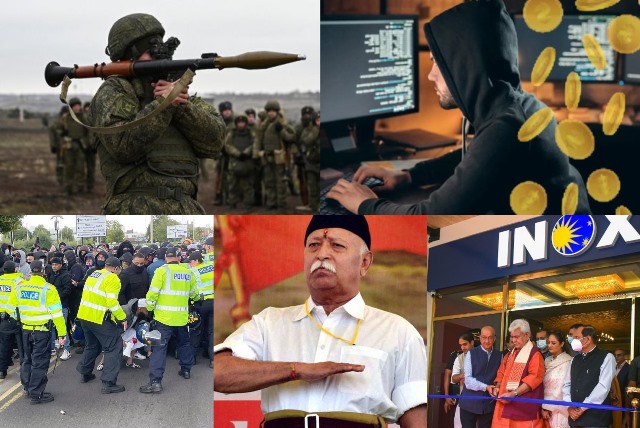
Five Things That Happened Last Week (And what to make of them)
In Ukraine, the war continues as does the propaganda
For a moment imagine that you have a time machine at your disposal. A contraption that can take you forward or, in this case, behind in time, at your whim and at any time. Let’s use it to go back to August 2, 1990. Where were you on that day? Ah, yes, many of you probably did not exist yet then and an equally large number of you were too young to remember. For the rest of us dinosaurs, if memory still serves us right we will be able to remember that date as the beginning of the Gulf War.
To quickly recap, it was a war waged by a coalition force of 34 nations led by the United States against Iraq to counter Iraq’s invasion and annexation of Kuwait. The war, which, towards the end, was codenamed Operation Desert Storm, lasted for around seven months, roughly as long as Russia has been waging its ongoing offensive against Ukraine right now.
The point of bringing up the Gulf War is, however, not about the reasons for that war or the controversy that surrounded it and later led to further turmoil and tension in the Middle East. The point was about how much we got to know about that war in real time and with reasonable levels of accuracy. One of the most distinctive factors about the Gulf War was the live reporting from the war zone. Most significantly, many will recall CNN’s 24×7 live reporting with images and videos from a Baghdad hotel. Millions of people across the world were able to access that reporting. In India, cable TV was taking baby steps then but in larger cities there were many venues where viewings were organised for the cognoscenti to watch what was happening in the Gulf.
Thirty-two years later, media technology has taken quantum jumps. Theoretically, international media groups today have access to technology and devices that can help them produce accurate, real-time reportage with much greater ease than the challenges CNN and other media organisations had to overcome back in 1990. And yet, reportage on the war in Ukraine is disputed and so pockmarked by propaganda from both sides that it is difficult to get a handle on the real facts. Russia, which has been waging the war now for seven months, insists that it now controls increasing parts of Ukraine. One the other hand, Ukraine claims that it has countered the Russian forces by weakening them and winning back lost territory. Nobody knows who to believe.
Recent reports suggested that Russia’s President Vladimir Putin has ordered conscription of 300,000 able-bodied male citizens to join the Russian military offensive. Thousands of people protested against the decision and faced a crackdown by the authorities. Meanwhile, Russia has also commenced holding referendums in what it considers Russia-occupied regions of Ukraine– Luhansk, Donetsk, Kherson and Zaporizhzhia. The referendums will seek people’s votes on whether these regions should be annexed by Russia. Ukraine and the NATO-aligned West believe that the referendums will be rigged and that the exercise is a sham. Meanwhile, the exodus of Russians to neighbouring countries continues with long lines of vehicles at Russia’s borders with two neighbouring countries, Finland and Georgia.
But as both sides continue to make claims and counterclaims over what is happening in Ukraine, the only fact that is real is that no one knows for sure what is really happening. And that is quite a deplorable comment on the credibility of contemporary media.
Is Moonlighting Here to Stay?
Wipro, the leading Indian IT company, recently decided to terminate the jobs of 300 employees when the company found that they were secretly working for other firms, including Wipro’s rivals, in violation of the terms of their employment contracts. The practice of working for another company while being employed in one company is known as moonlighting, thus named because typically it is work that is done secretly and at night.
Moonlighting is not new in the work arena. It is a common practice followed by many in industries and businesses where the individual employee doesn’t really need capital goods or a team of others to produce output. Take journalism or creative copywriting or even legal or financial advisory services. Even if employed by a firm exclusively, secretly an employee can do similar work, usually anonymously, for someone else and earn additional remuneration, which in many cases is untaxed or unaccounted for.
Wipro, which sacked 300 employees, responded in a predictable way. It found out that 300 of its employees were working illegally for rival firms and decided to terminate their services. Most companies, if they found that their employees were doing something like that, would follow Wipro’s example.
But what “work” really means has been rapidly changing. Especially in the past couple of years in the wake of the Coronavirus pandemic. Remote working or Work from Home (WFH) has become an accepted norm, not only in industries where individuals work without needing machines or factories but also in a limited manner in highly capital-intensive industries. In such a scenario conceivably working hours have become flexible and employees are able to enjoy far more autonomy and independence than they did before when they had to be in their workplaces or offices at fixed hours.
The new scenario is what is often referred to as the “gig economy” where instead of choosing one “job”, individuals can opt for a few different employers and allocate time and effort to work for each of them. Of course, there is the aspect of legality. If an employee insists on exclusivity (as most employers continue to do) then an individual would be violating their contractual obligation if they secretly worked for others.
But is it not time for employers to change the way they formulate contractual agreements with their employees? Or at least offer their employees contracts that are flexible enough for them to decide whether they can work on two, three or more “jobs” at a time? In some industries, the time may have come to go for that systemic shift.
Worrying Trends of Communal Tensions
What happened recently in the British city of Leicester can be compared to what often happens in many Indian cities and towns when an incident sparks communal tension, particularly between Hindus and Muslims. In Leicester, the incident happened to be a cricket match between India and Pakistan in Dubai on August 28. Mobs of Muslims and Hindus clashed for a number of days after India beat Pakistan in the match.
Although the cricket match is cited widely as being the trigger for the violence and the clashes, many believe that social media posts may have aggravated the incidents. Some believe that tensions have been simmering between the two communities among the immigrants from the sub-continent. As for the British authorities, they fear that unless reined in, such incidents could spread to other parts of Britain.
Inter-communal tension has been ratcheting up in India in recent years. After the Bharatiya Janata Party (BJP) came to power in 2014, anti-Muslim sentiment has been rising. Many believe that incidents such as what happened in Leicester recently could be influenced by the widening chasm between the communities in India.
RSS’s New Overtures
The Rashtriya Swayamsevak Sangh (RSS) is an Indian right-wing, Hindu nationalist organisation to which India’s ruling Bharatiya Janata Party (BJP) is affiliated. The RSS has a hardline against minorities such as Muslims in India and its stance has clearly been majoritarian.
So when the chief of the organisation, Mohan Bhagwat, 72, reached out to Muslim leaders recently, it was news.
Last week, Bhagwat met Imam Umer Ahmed Ilyasi, the chief of the All India Imam Organisation at a closed-door meeting in a New Delhi mosque. Not much is known about what transpired but RSS sources said that the meeting was a part of Bhagwat’s efforts to meet people from “all walks of life”.
But observers believe that the outreach to Muslims–Bhagwat also visited a Madrassa and met other Muslim intellectuals–could be a part of the move to soften the public perception of the right-wing organisation whose image is not exactly describable as tolerance or secular.
Cinema Halls Open in Kashmir
For the people in violence-torn Kashmir, there was a bit of good news last week as movie theatres opened after being closed for three decades. The theatres were shut when armed rebellion erupted in the state and public places such as cinema halls were targeted with violence.
The Lieutenant-Governor of Kashmir, Manoj Sinha, who inaugurated a new multiplex in the state, said, “The opening is a reflection of a new dawn of hope, dreams, confidence and aspirations of people” The theatre he inaugurated held a special screening of Lal Singh Chaddha, the Bollywood remake of Forrest Gump, starring Aamir Khan and Kareena Kapoor.
After the split of Jammu and Kashmir and the latter being brought under more direct governance of New Delhi, there have been sporadic protests by local leaders and a demand for democratised elections in the state, which are scheduled to be held in the near future.
Many believe that the opening of cinema theatres could be one more step towards normalcy in Kashmir.
Author Sanjoy Narayan is a respected editor and he cannot be unaware that many of the journalists who worked under him indulged in side hustle. I myself have no compuction in admitting that while in full time emplyment with an Indian newspaper I did moonlighting all through. But unlike some I never agreed to write biographies of industrialists, an abhorrent practice that leads one to write things that one knows are not right. But to each her/his own.
In celebration of India’s 50 years of Independene, FICCI brought out a prestigious 420 page commemorative volume ‘Footprints of Enterprise: Indian Business through the Ages’, I wrote a long piece on ‘The Eastern Region’ for which I got paid more than my monthly salary. I wrote editorials almost every week for over 12 years for Samar Sen edited Frontier for which I never accepted or got any remuneration. This I did for my politicial conviction – alas, withered a long time ago – and also to be with many of the best minds in the country. Let ethical kind of moonlighting prosper in every sector.



